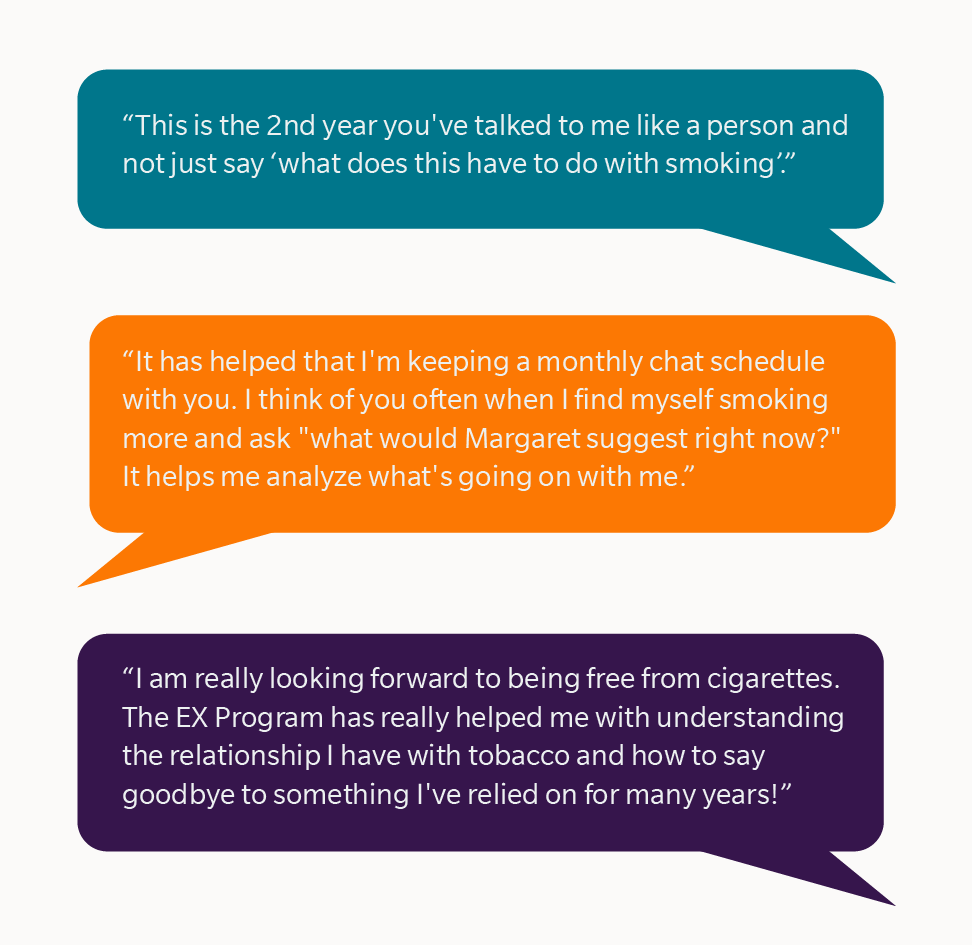What does it mean to be trauma informed and why is this important for people who coach tobacco users?
Let me explain.
What does it mean to be trauma informed?
Being trauma informed means that you recognize exposure to trauma elevates an individual’s risk for mental health and substance use challenges. It involves understanding the impact of trauma on physical, emotional, and mental health as well as on behaviors.
Social determinants of health and trauma
You’ve likely heard the term social determinants of health (SDOH).
SDOH are the non-medical factors that affect people’s health and quality of life. They can include education, healthcare, neighborhood/built environment, economic stability, and social and community context.
Each of these domains can impact or be impacted by the experience of trauma. Examples of traumas include childhood abuse, domestic violence, witnessing community violence, and neglect, to name a few.
When these traumatic events happen during youth, they are often referred to as “Adverse Childhood Experiences” or ACEs. ACEs are strongly associated with some of the most common and serious health conditions, and ACEs affect all communities.
Why is being trauma informed important for people who coach tobacco users?
Research shows the more ACEs an individual has been exposed to, the more likely they are to smoke.
Awareness and training in SDOH—and trauma in particular—have become important in our work with tobacco cessation as more people are comfortable sharing these experiences.
All SDOH factors can make it harder for people to quit smoking, vaping, and using nicotine. However, trauma specifically may cause individuals to smoke more heavily, to have higher levels of nicotine dependence, and to struggle with successfully quitting.
What is the difference between stress and trauma?
People tend to lump many things into the category of “stress” when describing why they smoke, vape, and/or chew tobacco. But it really could be trauma that is affecting their use.
We carefully listen to distinguish between the two.
Stress is the body’s response to pressure. Everyday situations can cause stress, such as angry customers at work, kids fighting, and snarly traffic due to an accident.
Trauma, however, is the impact felt from high levels of frequent or prolonged toxic stress. And it can take a cumulative toll on an individual’s physical and mental health. Acute trauma, such as a sudden death of a loved one, can also take the same toll on an individual’s health.
All EX Coaches are trained to connect the dots between what members tell us and how these things affect their tobacco use. We focus on treating each member as a whole person and take a trauma-informed care approach when appropriate.
What is trauma informed care?
According to the Substance Abuse and Mental Health Services Administration, trauma informed care is grounded in 4 assumptions and 6 key principles.
The 4 assumptions or “4Rs” are:
- Realize widespread impact of trauma and understand potential paths for recovery
- Recognize signs and symptoms of trauma in clients, families, staff, and others involved with the system
- Respond by fully integrating knowledge about trauma into policies, procedures, and practices
- Resist re-traumatizing individuals by utilizing the 6 guiding principles of a trauma informed approach
The 6 guiding principles for a trauma informed approach include:
- Safety: Ensure individuals know they are safe in our care.
- Trustworthiness & Transparency: Be clear in explaining the ways in which we can help individuals.
- Peer Support: Find ways to connect Individuals with shared experiences.
- Collaboration & Mutuality: Collaborate with individuals in the effort to develop a treatment plan.
- Empowerment & Choice: Encourage individuals to feel comfortable sharing their stories to take back control of their health.
- Cultural, Historical & Gender Issues: recognize any potential cultural, racial, gender or other biases that may affect how we treat individuals.
How EX Coaches apply a trauma informed approach
Applying these principles requires constant attention, caring awareness, and sensitivity.
Here are a few examples of how EX Coaches for the EX Program apply these principles with members:
- We provide a nonjudgmental, non-critical safe space for members to share their experiences. Using open-ended questions and reflections allow coaches to build rapport and develop trust so that we can have an honest and transparent conversation over chat about their tobacco use.
- We are not prescriptive but rather collaborative when discussing their quitting plan. We offer choices to help people feel in control when quitting often feels like something out of their control.
- We encourage members to engage in the EX Community for peer support.
- We participate in ongoing training to recognize biases based on cultural, racial, gender, or other factors that could affect how we approach supporting members.
EX Program participant testimonials
Abundant, positive feedback from our members shows this approach resonates. Here is a small sampling of feedback our EX Coaches have received from participants:
- “This is the 2nd year you’ve talked to me like a person and not just say ‘what does this have to do with smoking’.”
- “It has helped that I’m keeping a monthly chat schedule with you. I think of you often when I find myself smoking more and ask “what would Margaret suggest right now?” It helps me analyze what’s going on with me.”
- “I am really looking forward to being free from cigarettes. The EX Program has really helped me with understanding the relationship I have with tobacco and how to say goodbye to something I’ve relied on for many years!”
Learn more about our effective approach with helping all individuals who smoke, vape, and use nicotine to quit by visiting our Program page. Or contact us to start a conversation today.















